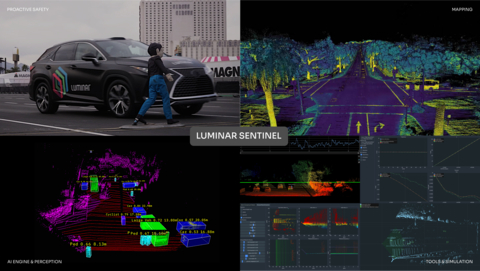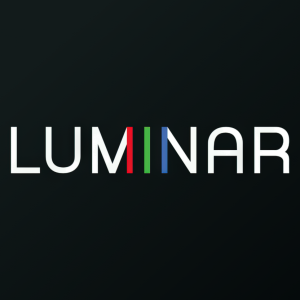Luminar Launches Sentinel Software for Automakers
Full Stack Software Development Kits to Ship to Top Automakers Beginning in Q3

Luminar Sentinel (Graphic: Business Wire)
Luminar’s Sentinel suite is a solution currently in-development to enable advanced safety and autonomous functionality with automakers, leveraging Luminar’s LiDAR hardware and AI-based software technologies developed primarily in-house by its software teams in Silicon Valley and
A recent comprehensive research report by Swiss Re, one of the world's largest reinsurance companies, demonstrated that cars equipped with Luminar LiDAR and a development version of Sentinel software showed dramatic safety enhancements and a reduction by as much as
“People know Luminar for pioneering LiDAR systems for global production vehicles, but since 2017 we have also been building next-generation AI-based software for improved safety and autonomy,” said Austin Russell, Founder and CEO of Luminar. “The majority of major automakers don’t currently have a software solution for next-generation assisted and autonomous driving systems. Our launch couldn’t be more timely with the new NHTSA mandate for next-generation safety in all US production vehicles by 2029, and as of today, we’re the only solution we know of that meets all of these requirements. This gives us the opportunity to dramatically expand our content value per vehicle in a high-margin capacity.”
Sentinel was first previewed by Luminar as a prototype in 2021 with a fraction of its current capabilities. The Sentinel software included in the kits is in continuous development, with the intent to be evaluated by automakers and technology companies for potential integration into future advanced safety and autonomous driving programs. Sentinel is built to be compatible with almost any consumer and commercial vehicle, including both combustion engine and electric drive train models.
Automakers can find more information about Sentinel and the evaluation program at https://www.luminartech.com/technology#sentinel.
About Luminar
Luminar is a global automotive technology company ushering in a new era of vehicle safety and autonomy. For the past decade, Luminar has built an advanced hardware and software/AI platform to enable its over 50 industry partners, including most global automotive OEMs. From consumer vehicle programs with Volvo Cars and Mercedes-Benz to technology partnerships including NVIDIA and Mobileye, Luminar is poised to be the first automotive technology company to enable next-generation safety and autonomous capabilities for global production vehicles. For more information, please visit www.luminartech.com.
Forward-Looking Statements
This press release contains forward-looking statements within the meaning of the Private Securities Litigation Reform Act of 1995. Forward-looking statements are based on expectations and assumptions by our management and involve a number of risks, uncertainties, and other factors that could cause actual results to differ materially from those stated, including that automakers will adopt our software for series production, that incorporating our technology will result in significant reductions in vehicle crashes and insurance costs, and that our technology can be incorporated in vehicles to meet new safety regulations. More information on these risks and other potential factors that could affect the Company’s business is included in the Company’s periodic filings with the SEC, including in the “Risk Factors” and “Management’s Discussion and Analysis of Financial Condition and Results of Operations” sections of the Company’s most reports on Form 10-K and Form 10-Q. The Company assumes no obligation to update any forward-looking statements, which speak only as of the date they are made.
1Sentinel has not reached technological feasibility and remains in development. The Development Kits are not working models of a production release version.
View source version on businesswire.com: https://www.businesswire.com/news/home/20240703502221/en/
Media Relations:
Milin Mehta
Press@luminartech.com
Investor Relations:
Aileen Smith
Investors@luminartech.com
Source: Luminar







